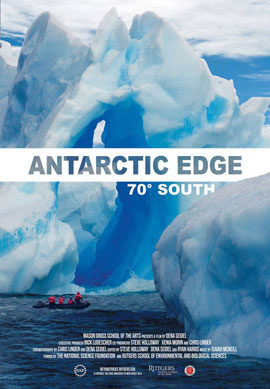Antactic Edge 70° South takes viewers to one of the most remote, inhospitable and breathtakingly beautiful regions on earth, the frozen shores of the Antarctic, on a voyage of scientific research that could impact the lives of humans everywhere. Filmmaker Dena Seidel sets out to show the work of oceanographer Oscar Schofield at the Long-Term Ecological Research (LTER) project, who has been studying changes in the seas around the frozen continent for 20 years. Schofield and his fellow scientists work out of Palmer Station on the Antartic Peninsula, which is some 600 miles due south of the southernmost tip of Argentina and Chile. The results of their studies to date are alarming - the sea ice around the peninsula is melting a full 3 months earlier than it used to, and winter temperatures have warmed by 11 degrees Fahrenheit, six times greater than the global average.
Schofield has been focusing on the impacts of temperature change on the wildlife of the Antarctic, particularly the plucky little Adelie penguins, which nest on the land and find their food in the sea. The surrounding oceans are rich in plankton and krill, which in turn attract humpback whales, seals and other marine life. But the change in temperature is already having an impact on the penguins, whose population has declined by 90%. To work out why, the scientists sieve the waters for plankton and krill, and shoot hollow-tipped arrows into the side of the whales to get samples of their skin and blubber. They make perilous trips in small inflatable zodiac boats, picking their way between frozen ice plates to reach the rocky shore where the Adelie penguins nest. There they capture individual birds, measure them, and attach radio tags so they can monitor how far they have to go to feed.
Seidel's film is beautifully shot, and gratifyingly non-didactic - there are no long lectures about the threat of greenhouse gases, merely scientific observations interspersed with the human stories of the scientists who every year come to this risky environment to continue their research. "We don't have any policy prescriptions," Seidel said during a Q&A after the screening, "we just wanted to show the scientists and their work."
The work is extremely risky. One man shows the fingers he lost in a shipboard accident, and each trip off the mother ship in the Zodiacs is fraught with hazard from the moving sea ice. And there is the "turtling iceberg" - a large iceberg that starts rocking 60 feet off the bow of their ship, threatening to tumble over onto the ship and potentially do significant damage. "It takes a certain type of person to work there," said Seidel. Everything in the Antarctic is calculated in the extremes, it seems, including the risks.

